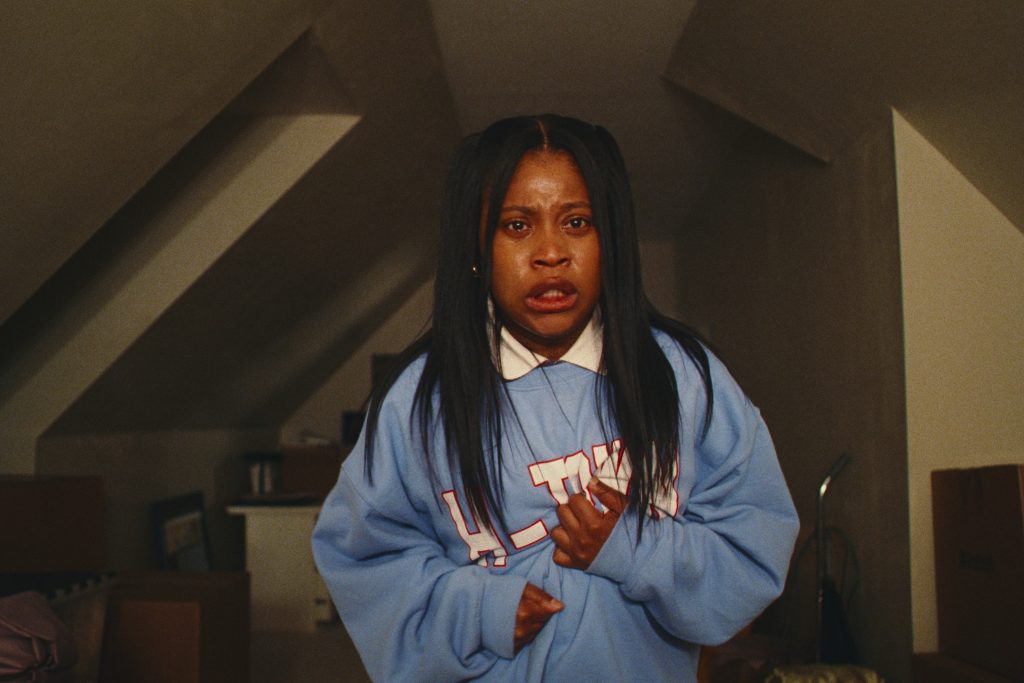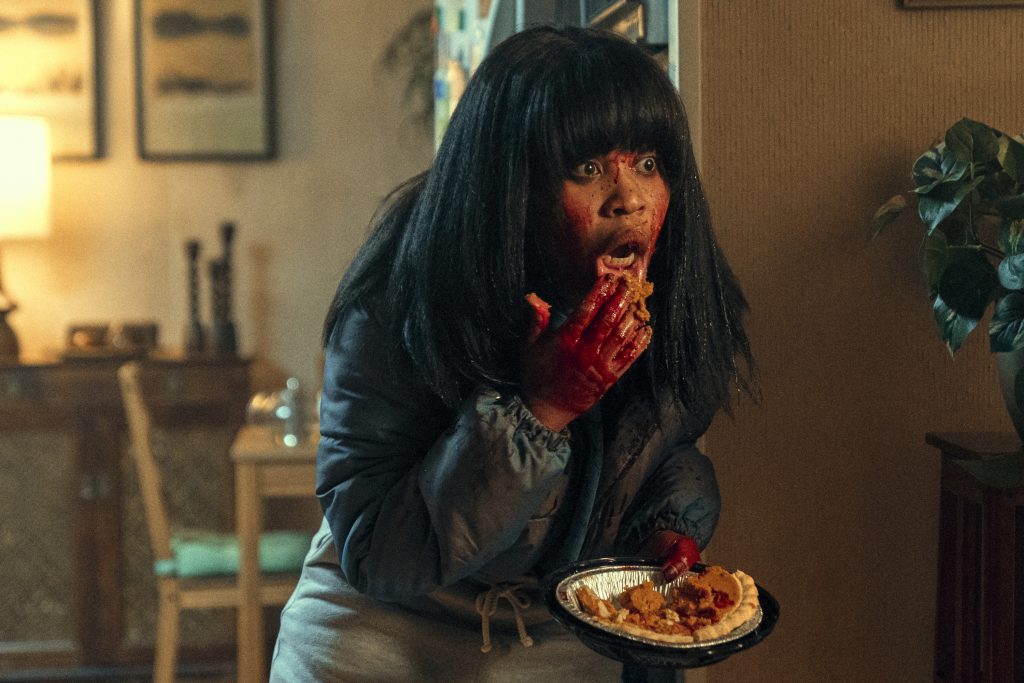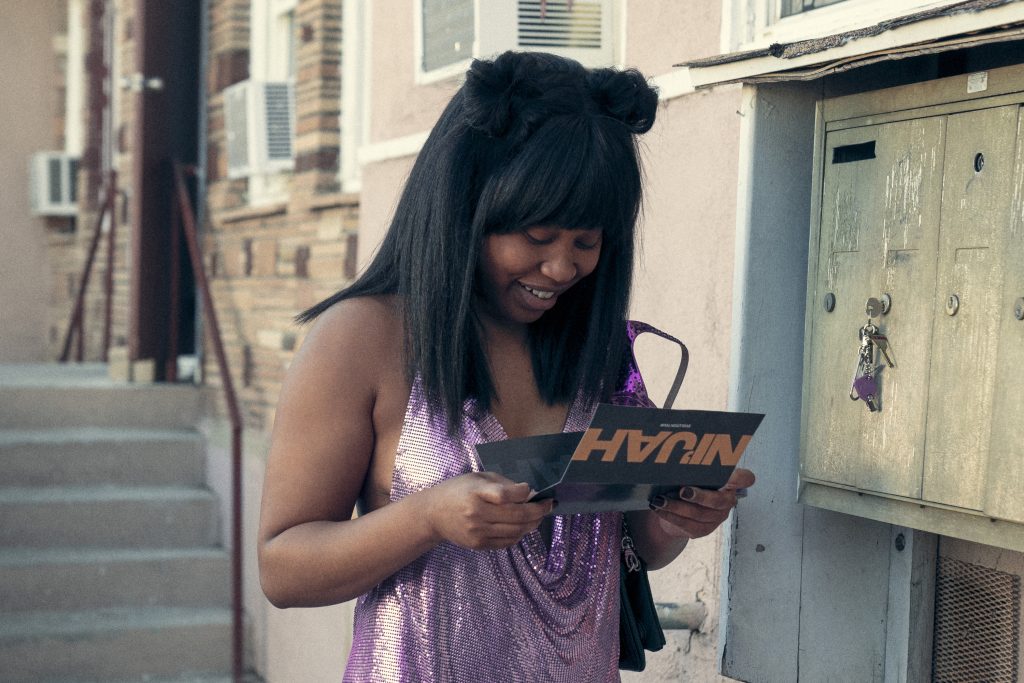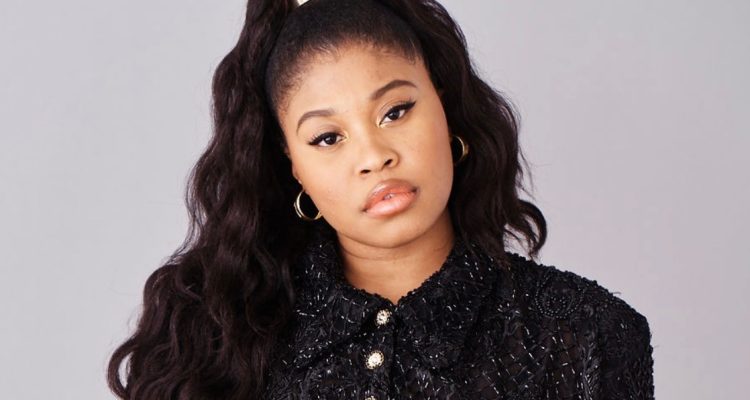“I know I have so much more to offer as an artist. I don’t want to get imprisoned by my own artistry.”
Breakout star Dominique Fishback has been making a name for herself with supporting roles on HBO’s “The Deuce” and in Apple TV+’s “The Last Days of Ptolemy Grey” alongside Samuel L. Jackson. Now, she’s tackling a headlining role in Donald Glover’s new Amazon series “Swarm” with a quietly savage performance that is turning heads as Emmy season begins.
Set between 2016 and 2018, “Swarm” follows Fishback’s Dre, an obsessed fan of the world’s biggest pop star who sets off on an unexpected, cross-country journey after a tragic event. The seven-episode series is a showcase for the young actress who embodies a horrifying characterization of a young black woman obsessed with a Beyoncé-style pop star and an insatiable, murderous appetite. It’s a role Fishback convinced Glover was hers to perform.
“He [Glover] asked me why I wanted to play the role, and I told him that after you do something like “Judas and the Black Messiah” and “Transformers”, what do you do next?” shares Fishback. “I was really fearful of the idea that I would get put in a box of the loving, lovey, love girl, but Donald understood, and he said if that’s the role you want, that’s the role you get.”
While the Janine Nabers and Donald Glover created series has been lauded for its high-concept, violent, and effectively pointed episodes that skewer fan culture, Fishback’s performance is astounding. The “Project Power” star is timid, intentional, and scarily muted as Dre first moves with her eyes and then with her body.
“Dre wears her heart on her sleeve, so everything that she feels, everything that she thinks, you’re going to see it before she says it,” explains Fishback. “Anytime somebody touches her, she has no inhibition. She’s not hiding who she is. A lot of times, when you act on film, you have to be smaller. Everything is more nuanced. Dre was overt, but she was also introverted, and that influenced how she walked.”
Ahead of the release of “Transformers: Rise of the Beasts”, Fishback spoke with Awards Focus about harnessing Dre’s physicality, convincing Donald Glover to cast her as the lead, the importance of Dre’s hair through the series, and why she advocated having an on-set therapist.

Awards Focus: The series is phenomenal, and you’ve been receiving outstanding reviews for your performance. What was it like to see those reactions, and did anyone reach out that took you by surprise?
Dominique Fishback: Jamie Foxx had written on my post that my choices were legendary, so hearing that from somebody like him was just amazing. Since we starred in “Project Power” together, he’s always spoken so highly, like Dominique will win an Academy Award. For him to feel that passionate was really nice.
I felt extremely fortunate because I put a lot into the character and specificity, so I didn’t know how it would be received. We’ve never seen a black woman take up space in a role like this, and I wasn’t sure if black women even wanted to see themselves portrayed in this light because it’s such a sensitive topic.
As artists, we’re oftentimes responsible for the representation of everyone in our race. So I had to push that out of my mind and believe that in the same way, I had an inkling to get into a character that other people wanted to see her too.
AF: You’ve worked in television for some time, but “Swarm” marked your first venture as a producer on a series. What was that transition like and collaborating with those moving parts of the show?
Fishback: Every set is different, and the way people take up space as a producer. For me, it was more about asking for what I normally give to any character. Whether I was a producer or not, I would’ve given the same amount of care and attention to the character and the script.
I started acting and writing in a program when I was 15, where we had to write our own stuff, so we learned how to build a character arc and how it connects to the entirety of the project. So that’s the lens I always come from. I knew the responsibility I had, and I just wanted to ensure as much as possible that my voice and my ideas were heard.
AF: The series follows Dre across two and a half years. There’s so much about her shell that she changes. How did you approach the physicality of Dre as she keeps moving?
Fishback: It was interesting because I’m such a psychological actor, and normally, I would journal as my characters, but with Dre, I couldn’t because her lines were so surface-level, and they didn’t really give insight into psychology. Donald [Glover] and Janine [Nabers] said Dre is emotionally stunted. They didn’t want to label her. They didn’t want to tell me much of her backstory, so I really had to come to set and go with my impulses. If I had journaled, I knew she would not be as impulsive as she is in the show.
In that scene with Paris Jackson’s character in episode two at the diner, Dre gargles the apple juice at the end of the take. She likes what she likes, and then Dre eats the strawberry, spits it out, and moves the plate off the frame. That happened impulsively because I knew that Dre feels everything so viscerally, and she didn’t hide it. When I bit into the strawberry, it was bitter for Dre. She has an opinion about everything and is not afraid to show it.

AF: She’s satiating this indelible hunger that I took as a parallel to the void left by Marissa’s death. Did you find it difficult having to gauge yourself constantly with food?
Fishback: The pie-eating was interesting because I’m not even a pie girl. I think it would’ve been worse if it had been an apple pie, but I asked for pumpkin pie, and now I can never eat pumpkin pie again [laughs]. So I just threw myself into it. The last scene of the first episode was shot in one take, so I didn’t have to do a lot of eating of the pies. But in the strip club scene where she gets upset and takes the guy’s food, bites it, and throws it back – that was also an impulse.
AF: It’s interesting listening to how deeply you could feel Dre and have those impulses. Were those instincts that came out during the audition process?
Fishback: There actually wasn’t an audition process. I had just finished filming “Transformers: Rise of the Beasts”. I was so tired, and I decided to take a break. My team messaged me and said Donald Glover has a project, and he wants you for it, but they didn’t know anything about it. All they said was that Donald wanted me to watch a French movie called “The Piano Teacher”. So I watched it and thought, wow, this is a character study. You see everything in this character’s eyes. I was excited, but the film took a dark, masochistic turn, and I was like, oh man, why did he have me watching this?
I didn’t want to say no, but I wasn’t sure if I was that brave. My team convinced me to listen to what Donald had to say, so I got on a call with Janine [Nabers] and Carmen Cuba, the casting director. They told me about the show, and Janine said they wanted me to play Marissa. It was like a record scratch. They got me so excited about everything Dre does, and as an actor, I’m chomping at the bit and ready to dive in, but then they say… Marissa. I knew at that moment I didn’t want to play her; I wanted to play Dre. I told my team, and they said I might have to fight for it. And I said, “Well, that’s the nature of the beast.”
I got on the phone with Donald, and he asked me why I wanted to play the role. I told him that after you do something like “Judas and the Black Messiah” and “Transformers”, what do you do next? How do you not catch up to your own self? I was used to playing characters who were easy to relate to, accept or put under your wing, and, like, easier to love. I was really fearful of the idea that I would get put in a box of the loving, lovey, love girl or something. I know I have so much more to offer as an artist. I don’t want to get imprisoned by my own artistry. Donald understood and said if that’s the role you want, that’s the role you get.
AF: It doesn’t sound like you got to go on that vacation.
Fishback: Right?! I know. But after “Swarm” I took six months off.

AF: What was the most challenging scene for you to film as Dre?
Fishback: The scene with Kiersey Clemons was the most difficult one, energetically and emotionally. I always want to be a vessel for my character. This was the first kill that Dre does in which she loves the person. It’s really, really intimate. The other kills are with an object, and this one is with her bare hands. You can see in her that she almost doesn’t wanna do it. It was also emotional because of how Kiersey performed that scene. I get chills because she didn’t hold back. I love actors who are not afraid to make their characters unlikeable. Especially women, you know? There’s this whole concept that women must be likable characters, so I love it when actors go for it and be the ugliest part of the human psyche.
That moment broke Dre because those were the words she had heard her whole life. Marissa never said those things to her. The girl doesn’t like Ni’Jah and says all these hurtful things. Dre trusted somebody and thought this person loved her. I asked for a therapist to be on set for those scenes, and for that particular one, I really needed it. I didn’t know if I was doing something wrong because it was also domestic violence. It was just a really sensitive topic. I went home exhausted, physically in pain, like my body was aching and I couldn’t keep my eyes open. I just remember being like, what happened?
AF: Also, that characterization of Tony was, I felt, the scariest part of Dre.
Fishback: How come?
AF: The calmness was so disturbing, and the fact that she went into this relationship at all and met her family. She walked with more swag, and so it felt so intentional how she was acting as Tony.
Fishback: [Nodding] Yup.
AF: But it was also the hair. Dre’s hair kept changing as she moved from place to place, and it was starkly different with Tony. What were those conversations about her hair as she moved away from Marissa’s death?
Fishback: I have to give so much thanks to DeeDee Metzger, who was my hair person on the show and did my hair on “The Last Days of Ptolemy Grey”. When I first started acting, they said that the sanctuary for actors is always the hair and makeup trailer. You need them. They’re the first people to see you in the morning and see you again at the end of the night. So I give thanks to her because she’s very collaborative.
I really thought that Dre would look disheveled and manic, but Donald and Janine, from the beginning, said that every time she kills, she gets more confident. So her hair began to look better, and her clothes too. It was subverting the idea of serial killers. Would Dre get letters in jail? Would she be loved like that? It was nice to play with the idea that she has a nice body and is seemingly normal. It was more like let’s play up Dre’s features and her assets and make her look fly. I don’t get to talk about hair often, so that’s such a great question.
AF: I love what you’re saying about playing up Dre’s features and the confidence she gains when she kills because we see that in the second episode at the strip club. Her first dance is cold and self-conscious, and then she starts feeling herself and impressing everyone around her.
Fishback: That was one of those producer moments because, initially, there were two dances in the script. I got a script closer to filming, and the second dance wasn’t there anymore. So I reached out to Donald, saying, hey, can we revisit this? I think it’s important not just for Dre’s arc but to ensure that even though she was in her mind, she was still grounded and had some control. She still had awareness. She can watch and say, I know what the world likes, and I can choose to do that.
It’s the fact that she can do it, and she chooses not to, that’s even more powerful and even scarier. It plays into the fact that she can play these different characters and take on these different roles and convince people that she’s something else.


